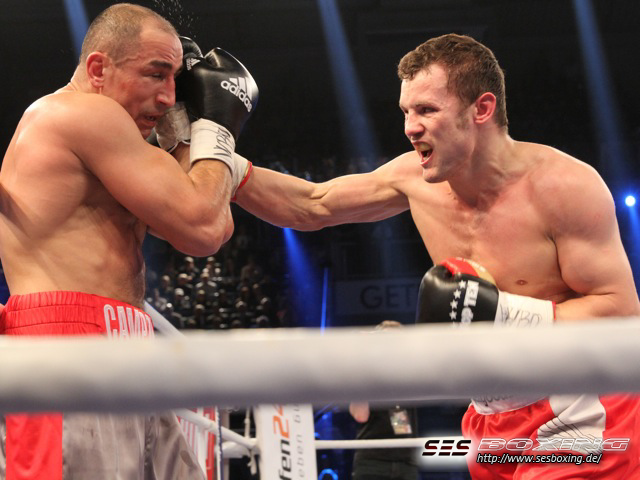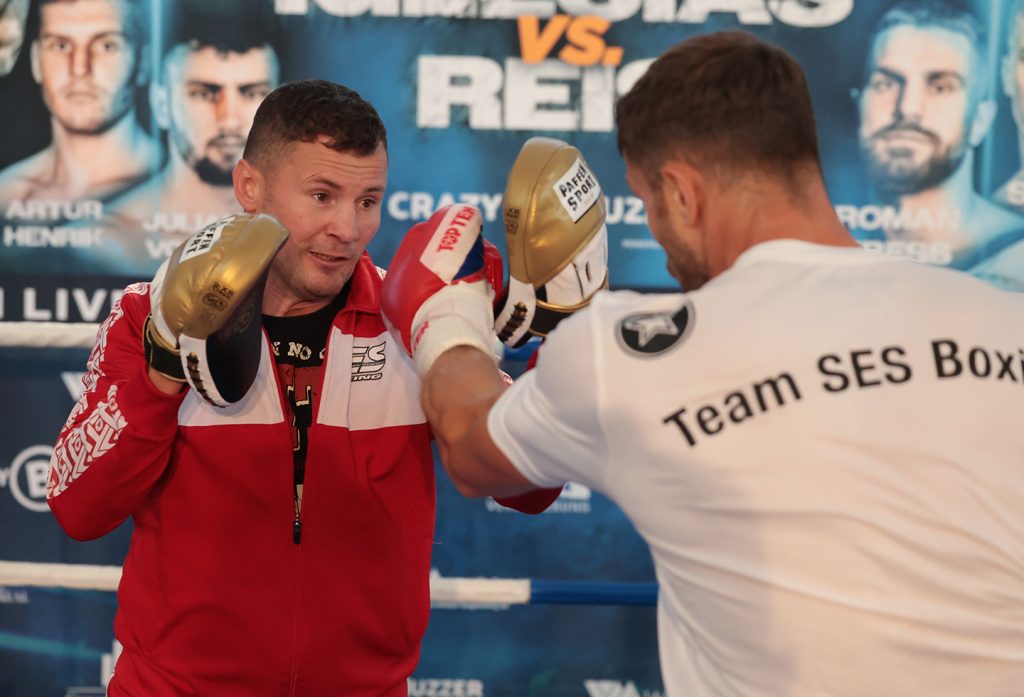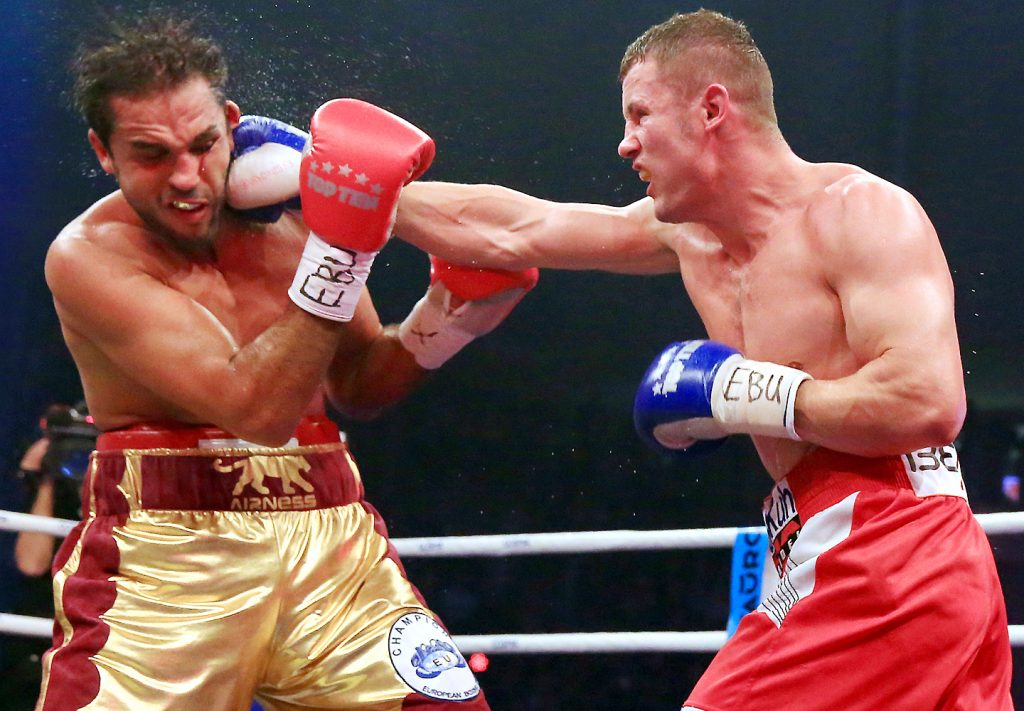Best I Faced: Robert Stieglitz

Robert Stieglitz wasn’t the most talented boxer, but he was more conscientious than most and was able to rise through the ranks and become a two-time WBO super middleweight titleholder in the late 2000s-early 2010s.
Stieglitz, whose birth name was Sergey Shtikhlits, was born in the small coastal town of Yeysk, in the south of Russia on June 20, 1981.
“I was born there and moved to Belovo, Siberia, where my mother comes from, when he I was about a year old,” Stieglitz told The Ring. “We lived there until we were 10-years-old and moved back in 1991.”
Initially he liked football and then wrestling before taking up karate, but then he found boxing at 15.
“Karate was my first sport, I was good at that,” he explained. “I tried as a challenge to box and lost a first ‘try out’ fight. So, I was depressed. I finished karate and worked hard to get better in boxing. The result you can see now. In the gym I’m a hard, hard worker and out of this the success follows.”
Stieglitz went on to win some local tournaments and then won the Russian championships in 2000. All the while maintaining his education.
“[I went to] normal school, then attended sports colleges,” he said. “Then university and I graduated from university remotely as an athlete and trainer, everything related to sports.”
Stieglitz, who went 80-10 as an amateur, was offered the opportunity to sign with German promoter SES Promotions. It was too good a chance for him to pass up and he moved to live in Germany.

Robert Stieglitz (left)in his new role as trainer – Photo courtesy of Team SES/P. Gercke
Interestingly, although Stieglitz is Russian-born, Yeysk is part of the German diaspora, meaning German descendants who live outside Germany.
“I’ve felt like a German boy since birth,” he admitted. “I was a German in Russia, born there but always a German with a German passport. This causes all kinds problems, in school, in my sports career and after finishing school there was only one way to go back to Germany.
“When I was almost 20, I moved to Germany with my family. My family accepted that and stood by my side.”
Stieglitz turned professional in 2001 and stayed active while continually improving picking titles light heavyweight and super middleweight. He decided his future was at 168-pounds and impressively stopped power-punching Colombian Alejandro Berrio (TKO 11) in an IBF title eliminator in December 2005.
A few months later, WBO titlist Joe Calzaghe relieved Jeff Lacy of the IBF title in a unification. Stieglitz hoped for a fight with the wonderfully talented Welshman. However, when Calzaghe vacated the title in search of bigger opportunities, Stieglitz ended up meeting old rival Berrio in March 2007.
Stieglitz was the pre-fight favorite to win over his power-punching Colombian opponent. However, perhaps he was a little too confident.
“Berrio showed me my problems at that time with my defence,” admitted Stieglitz, who was stopped in three-rounds. “I’m always a fighter with a high workrate, a lot of pressure, and sometimes this causes problems with my defense.”

Robert Stieglitz (right) Photo courtesy of Team SES/P. Gercke
The German-based fighter claimed two wins before heading to Cabazon, California to face teak-tough Librado Andrade on HBO: Boxing After Dark in March 2008. Stieglitz wasn’t helped by going into the fight with a fever but also hadn’t corrected his previous issues with defense and was stopped in eight-rounds.
Stieglitz moved in a different direction, winning four fights, notably edging past previously unbeaten Lukas Wilaschek (SD 12). He was rewarded with a shot at Károly Balzsay, who held WBO title, in Budapest, Hungary in August 2009.
“It was clear to me that I would never win on points, so I had to go for the KO,” said Stieglitz, whose relentless pressure forced Balzsay’s corner to throw in the towel at the end of the 10th Round. “Clever tactics from us, I showed physical and mental strength. The little things decided the fight.
“That was an indescribable moment in my life, it was a special crowning glory. We stayed up all night, no matter where we were, we were warmly greeted. I celebrated at home with my family.”
Over the next three-years, Stieglitz reeled off six successful defenses, notably besting the iron-jawed trio of Eduard Gutknecht (UD 12), Enrique Ornelas (UD 12) and Nader Hamdan (UD 12).
“The time I had put into training was worth it and paid off,” he said proudly of his championship tenure. “I enjoyed the time and lived for the sport. I flew away after every fight and enjoyed my rest, the sun, my freedom and fun. After which I continued training.”
Stieglitz had a four-fight series with fellow German transplant Arthur Abraham in the early 2010s.
“When I did the first fight against Artur Abraham, I was world champion and I felt like a loser,” he admitted. “I wasn’t in the best shape, I had problems in my hand and several other things in my surroundings that weren’t as good as they could have been.
“In the second fight, I clearly defeated him. It was a fight with a plan, a strategy of pressure. We were very superior. Abraham’s closed eye was one result of this and at least the fight was over after the third-round. I said the belt was only lent for one fight and as promised I got it back. So, we were completely satisfied.
“The third fight was controversial. I went down in the last round; it does not mean that I lost the fight. The fourth fight I clearly lost [TKO 6.]”
Stieglitz also shared a ring with former multiple world champion Felix Sturm (D 12) before the fourth Abraham fight. He then resurfaced up at 175-pounds and was able to claim the European title but decided to retire from boxing for the sake of his health with a record of 50-5-2 (28 knockouts).
“My family and my children, they needed their father, and after 57 professional fights one should withdraw,” he explained. “I’ve achieved everything in my professional career.”
Stieglitz, now 42, is married, he has three children, a son from his first marriage and two with his current wife. He lives in Biederitz, a suburb of Magdeburg, where he is a boxing trainer for several fighters including Roman Fress, Adam Deines, Tom Dzemski and Oronzo Birardi.
He graciously took time to speak to The Ring about the best he fought in 10 key categories.
BEST JAB
Alejandro Berrio: “His jab was hard, fast and unorthodox.”
BEST DEFENSE
Arthur Abraham: “Arthur’s defense was good; he had long arms and could cover up well.”
BEST HANDSPEED
Károly Balzsay: “His shots were damn fast and without effort.”
BEST FOOTWORK
Librado Andrade: “He was so good with his legs; he was always there.”
SMARTEST
Balzsay: “Balzsay and Abraham weren’t world masters for nothing. I would say Balszay, he was trained as boxer and smart to watch.”
STRONGEST
Abraham: “Artur was the strongest. I noticed that when fighting with him and hitting Artur Abraham was the hardest.”
BEST CHIN
Eduard Gutknecht: “I hit him with many hard hits and left no effect.”
BEST PUNCHER
Abraham: “I would say Arthur. It felt like I got hit by a baseball bat!”
BEST BOXING SKILLS
Balzsay: “I think Károly Balzsay had the best boxing skills, he was really good at classic boxing and also a southpaw.”
BEST OVERALL
Abraham: “Artur Abraham and Károly Balzsay were my best and strongest opponents ever, they were world champions. Balzsay was better trained as a boxer and Artur had better punching power. They were both strong and clever. I would say Abraham was the best, we had four great fights and he was a strong champion at middleweight and super middleweight.”
Questions and/or comments can be sent to Anson at [email protected].














